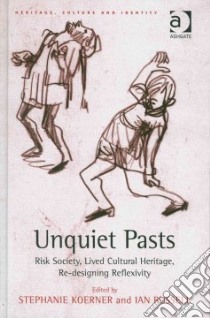Unquiet Pasts - 9780754675488
Un libro in lingua di Koerner Stephanie (EDT) edito da Ashgate Pub Co, 2010
- € 121.90
- Il prezzo è variabile in funzione del cambio della valuta d’origine
This series explores all nations of heritage - including social and cultural heritage, the meanings of place and identity, multiculturalism, management and planning, tourism, conservation and the built environment - at all scales from the global to the local. Although primarily geographical in orientation, it is open to other disciplines such as anthropology, history, cultural studies, planning, tourism, architecture/conservation, and local governance and cultural economics.
This important book concerns critical themes in the development of archaeology as a reflexive, self-critical discipline in the modern world. It explores ethical, political and cultural tensions and responsibilities which need to be addressed by archaeologists when working within networks of global ecologies and communities, and how authoritarian traditions can exacerbate the divide between expert and public knowledge. Moreover, it analyses how localised acts of archaeology relate to changing conceptions of risk, heritage, culture, identity, and conflict.
Bringing together insights of Alain Schnapp, Michael Shanks, Isabelle Stengers, Bruno Latour, Ulrich Beck, John Urry and other contributors to cross disciplinary discussions of these themes, it shows how archaeological discourse can contribute towards engaging and understanding current dilemmas and how archaeology as a responsibly exercised, reflexive and localised practice can play a part in building our commonly shared and experienced world.
This fascinating and important collection demonstrates the creative possibilities of a reflexive, self-aware analysis of a learned practice. The dialectics of past and present, object and culture, and discoverer, audience and analyst, are all explored to great effect. If only the natural sciences could learn the lesson - how much better and safer the world world would be! Jerome Ravetz, Oxford University, UK
Informazioni bibliografiche
- Titolo del Libro in lingua: Unquiet Pasts
- Sottotitolo: Risk Society Lived Cultural Heritage Re-designing Reflexivity
- Lingua: English
- Autore: Koerner Stephanie (EDT)
- Editore: Ashgate Pub Co
- Collana: (Hardcover)
- Data di Pubblicazione: 16 Gennaio '10
- Genere: SOCIAL SCIENCE
- Argomenti : Archaeology Social aspects Archaeology Moral and ethical aspects Archaeology Philosophy
- Pagine: 350
- ISBN-10: 0754675483
- EAN-13: 9780754675488


